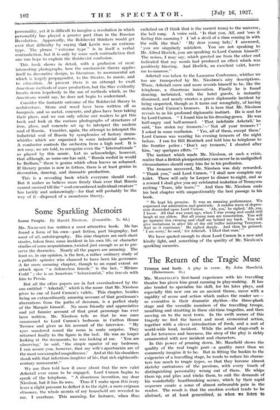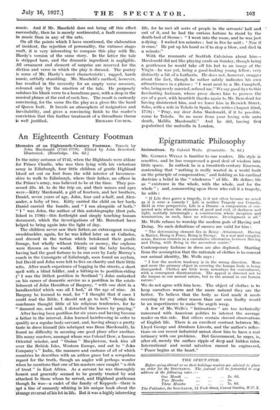The Return of the Tragic Muse
MR. MASEFIELD'S first-hand experience with his travelling theatre has given him great cunning in play-making. It has also tended to specialize his skill, for his later plays, and especially this new one on an ancient theme, move with a rapidity of scene and action which makes the reader see— so evocative is their dramatic rhythm—the three-plank stage and the versatile members of the travelling troupe, mouthing and strutting in these old-time tragedies, and then moving on to the next town. In the swift scenes of this tragedy we find the barest and most economical action, together with a clever introduction of fresh, and a sort of world-wide local, incident. While the actual stage-craft is all for terseness and bareness, the story of the play is richly ornamented with new incident and characters.
In this power of pruning down, Mr. Masefield shows the quality of the real tragic poet—a quality rarer than we commonly imagine it to be. But in fitting the busldn to the exigencies of a travelling stage, he tends to reduce his charac- ters too much to tragic types, so that they become almost sketchy caricatures of the passions, with every touch of distinguishing personality wrung out of them. He whips them up, and plies and tricks them, to suit the demands of his wonderfully heartbreaking scenes, which by their rapid sequence create a sense of almost unbearable pain in the reader. The result is that the emotion evoked tends to be abstract, or at least generalized, ft.g when we listen to
music. And if Mr. Masefield does not bring off this effect successfully, then he is merely sentimental, a fault commoner in music than in any of the arts.
On all the points which I have mentioned, the elaboration of incident, the rejection of personality, the virtuoso stage- craft, it is very interesting to compare this play with Mr. Hardy's version of the same story. In the latter the tale is stripped bare, and the dramatic ingredient is negligible. All ornament and element of surprise are reserved for the diction and verse in which the play is dressed. The poetry is, some of Mr. Hardy's most characteristic ; rugged, harsh music, artfully stumbling. Mr. Masefield's method, however, has resulted in the necessity for an empty verse measure, coloured only by the emotion of the tale. He purposely subdues his blank verse to a humdrum pace, with a drop in the musical phrase at the end of each line. The result is curiously convincing, for the verse fits the play as a glove fits the hand of Queen Isolt. It breeds an atmosphere of resignation and inevitability, and gives a convincing finish to the reader's conviction that this further treatment of a threadbare theme











































 Previous page
Previous page